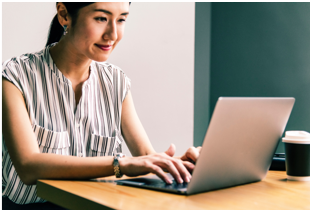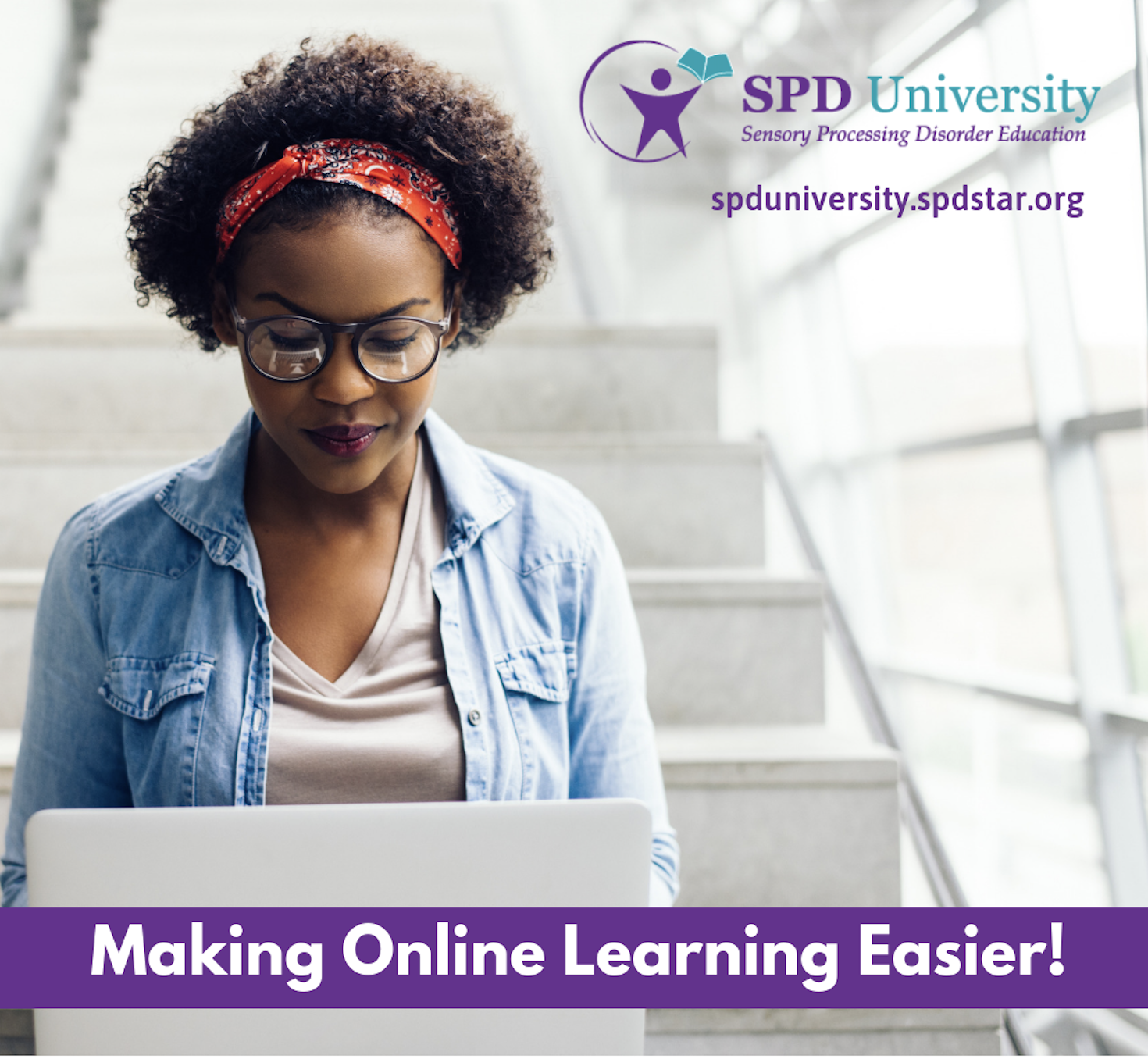
Subscribe Today and STOP Paying-Per-Course!
Get unlimited access to the best educational content on Sensory Processing Disorder, with over 60 courses available 24/7 from anywhere in the world with internet access.
OT/SLP Subscription plans also include AOTA/ASHA* CEUs. Subscription plans for organizations are available, which provides access for multiple employees of an organization at a reduced rate.
*ASHA CEUs available for SOS Advanced Courses only.
Self-agency and Sensory Processing
by Mim Ochsenbein, MSW, OTR/L
I love my profession. I truly do! Occupational Therapy led me to my ongoing passion, the study and ever-evolving practice around sensory processing. To me, the field of sensory processing embodies all of the same things that thrill me about OT. In just one discussion about one client we go into detailed neurology, physiological functions, psychological dynamics, and what brings joy to a person. And it is all pertinent. It’s fascinating.
Sensory processing is relevant to EVERYTHING. Think about it…
It doesn’t matter what practice area you are in, or even what discipline – every single client you work with has sensory systems, and all of these sensory systems are directly impacting the therapy you are providing and all aspects of the life that client is leading. And I’m not just talking about the level at which the client is seeing and hearing you or feeling the muscles and limbs you are trying to help strengthen. It’s so much more than that!
The interoceptive system is the foundation for the emotional awareness and control that you tap into as you provide relational based therapy (aka therapeutic use of self). The sense of self and physical placement in the world that we take for granted – well, you need to thank the vestibular system for its necessary role in that. It’s no coincidence that as you improve your client’s postural control and stability that they simultaneously develop better regulation, awareness, and relational capacities as well. The mastery we develop over our interactions in the physical world is a through-line to the development of self-confidence. Feelings of self-agency, self-efficacy, and self-esteem are very real and very important aspects of the human experience and they are tightly bound to our sensory processing abilities.
Seriously though, our profession is pretty cool! AND guess what?
This is precisely the topic of our 22nd International 3S Symposium titled Sense + SenseABILITY. During this two-day conference, presenters will discuss the primary role sensory processing and sensory motor integration play in everything that we do and what that means for participation, function and self-actualization.
And here’s the other amazing thing. Our understanding of sensory processing – how it works, what it impacts, and how to create changes in it – is growing daily. It never gets old! To the contrary, the bigger problem seems to be keeping up with all of the research and then trying to figure out how to apply it to practice. There’s so much, it can feel completely overwhelming. So, what do we do?
Well, first, we commit ourselves to doing something. That something can be reading one relevant article per month or putting together an online group of therapists who can bounce questions and ideas off one another. Maybe commit to a more advanced training process or seek out a mentor. Go to a conference, or two. Whatever it is that you choose to do, commit to it for a year. You will be amazed at what you walk away with by the end of that year.

Opportunities for Clinical Group Supervision 
Take advantage of this unique opportunity to engage in problem solving through a collaborative model, guided by STAR-trained expert clinicians. Bring your toughest questions and complicated cases to our new Clinical Group Supervision program for occupational therapists. Each group meets for five 1-hour sessions to ask, learn, and grow around their most challenging cases. Sessions are currently scheduled through December 2019 and conducted online via Zoom video conferencing.
Top Online Learning Picks
Understanding Telehealth • Live Webinar on May 16th
Telehealth is a mode of service delivery for occupational therapy services which is becoming more utilized to meet the healthcare needs of a variety of individuals. Jayna Fischbach, PhD will walk participants through the basic regulations for licensure, practice acts, reimbursement, malpractice insurance, and technology requirements for providing telehealth services. Supports and challenges for practitioners providing telehealth services will be reviewed to provide participants a foundation for starting to use telehealth. A recording will be available for later access. More details
Mechanical or Dynamic? Discussing and Disputing Posture Models • Live Webinar on June 5th
Recent advances in pain science and medical research have allowed modern health and wellness practitioners to move beyond the old, “architectural” model of human posture. Kevin Moore will explore the foundations of a new model: a dynamic system built on the tension between seeking out information and retreating from threat. A recording will be available for later access. More details
Parenting the Sensory Challenged Child: Addressing Challenging Behavior and Building Resiliency
Sensory processing challenges influence children's emotional regulation and relationships. When we appreciate how a child is reacting to situations from a sensory perspective, we can support a child emotionally through attuned relationships, and personalized "body-up" and "top-down" techniques that are suited to a child's social-emotional processes. More details
1115c Searching for Stability: A Systems Approach to Postural Control in Children with Challenges
Over the last decade postural control has increasingly been discussed as a function of the interaction of multiple systems, in keeping with dynamic systems theory. This one-hour introductory presentation begins with an overview of the literature on postural control in children with sensory and motor challenges. Several key sensory systems and their interactions are also discussed as they impact the development of postural control. Mature postural control is explored in terms of an anticipatory component and the research regarding central stability is discussed as a cornerstone of anticipatory postural control. Finally, a 21st century approach to central stability and postural control using the dynamic nature of the systems is presented. More details
2115c Searching for Stability 2: Anatomy, Alignment, and Anticipatory Postural Control
In this presentation, we delve into the anatomy, architecture and recruitment of the diaphragm and pelvic floor and their relationship to mature postural control. The dynamic systems model continues to prove useful as we explore the connections between anticipatory postural control, continence and interoception. Finally, a practical exploration of 3 components of alignment will serve as a foundation for clinical assessment and treatment of anticipatory postural control. More details

Upcoming Courses
Level 1 Intensive Mentorship Program
May 20-24, 2019 • Denver, CO | June 17-21, 2019 • Denver, CO
July 15-19, 2019 • Denver, CO | July 19-22, 2019 • Los Angeles, CA
Working in a small-group setting, participants of STAR Institute’s Level 1 Intensive Mentorships learn to apply clinical reasoning through treatment observation, analysis and group processing/supervision with experienced therapists and faculty. Experience active mentoring before, during, and after observed treatment sessions. Sessions are scheduled throughout the year at STAR Institute and various off-site locations. More details
Laterality, Posture & Sensory Processing
May 4, 2019 • Denver, CO
The research on side dominance, or laterality, is rapidly advancing treatment practices in mental health as well as physical/occupational therapy— and The Reembody Method® is leading the charge. In this 10-hour workshop, join Reembody Method® founder Kevin Moore as he shows how the biomechanics of laterality can improve proprioceptive processing and movement health for adolescent and adult clients living with sensory processing disorder. More details
Movement Medicine: A Posture and Movement Workshop
May 6, 2019 • Denver, CO
Discover the power of side dominance and how it affects the way you move, train and heal your body! Join Kevin Moore, founder of The Reembody Method®, as he explains three simple strategies that will change your posture, increase your functional strength and maybe even shift your perspective. Improve core stability, functional strength and balance. More details
School-based Intensive for Occupational Therapists
May 31-June 1, 2019 • Franklin, MA | June 28-29, 2019 • Mt. Laurel, NJ
This intensive training course supports the clinician to gain an advanced understanding of sensory processing and integration theory, the STAR frame of reference adapted for the schools, evaluation, and various strategies of intervention. Clinicians learn to apply clinical reasoning through lectures, video treatment observation and analysis with experienced STAR faculty. Foundational information is presented via online recordings in advance of the in-person workshop. The course will end with an opportunity for each clinician to develop an action plan to take back to their own practice. More details
SOS Approach to Feeding Conference
June 20-23, 2019 • New Orleans, LA | December 5-8, 2019 • Sacramento, CA
Expand your practice and make a difference in the lives of children with all levels of feeding challenges! The SOS (Sequential Oral Sensory) Approach to Feeding is a renowned, transdisciplinary program for assessing and treating children with feeding difficulties and weight/growth problems of all ages, with a special focus on children from 12 months to 5 years old. It integrates posture, sensory, motor, behavioral/learning, medical and nutritional factors to comprehensively evaluate and manage children with feeding/growth problems. More details

